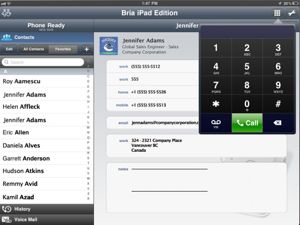Consumer tablets can kill the office desk phone, says CounterPath
One year ago, we took a look at CounterPath's Bria softphone clients for PCs and mobile devices. Today, CounterPath has released Bria iPad Edition 1.0, which the company believes is a perfect example of effective IT consumerization because it strikes a balance between the feature-heavy, yet immobile desk phone and the versatile, yet feature-light consumer smartphone-based VoIP.
"The deskphone…looks ill-suited for today's work style, where employees need anytime, anywhere access to voice and data --exactly the kinds of applications where a tablet shines," a CounterPath representative said today. "[But] VoIP applications for tablets have been clunky and user-unfriendly to the point that they undermine the responsiveness and productivity they're supposed to enhance."

Like Bria for iPhone (iOS4+) and Android, the iPad Edition supports multiple accounts on any SIP compliant server, support for hosted VoIP and IP-PBXs, multitasking support, support for bluetooth speakers and headsets, call hold, transfer, conferencing, display and history, calling over Wi-Fi, 3G, or 4G, and native support for all of CounterPath's other desktop and mobile VoIP solutions. The main advantage of iPad is its larger screen, so the app takes advantage of this with a new multi-pane UI that includes a pop-over dialpad.
Does any of this actually "kill" the desktop phone? Not yet, of course. But CounterPath said the first update to the software later this year will add video calls, SMS, Instant Messaging and presence; and the more features applicable to an enterprise setting it has, the better chance it has at adoption.
Besides, cloud computing company Model Metrics and Dimensional Research released research data in May that said only about 22% of businesses surveyed had officially deployed tablets, but 72% have iPads and other tablets being used on an individual basis.
Forrester's research on the consumerization of IT turned up similar results. Only 4% of the firms with over 1000 employees that Forrester surveyed actually had a consumer tablet deployment in place, and 26% had plans to eventually incorporate the iPad or something similar.
Consumer-style Web applications, according to Forrester, do have a slightly better chance of breaking through in enterprise than consumer hardware with dedicated third-party applications like Bria. 84% of the firms Forrester surveyed said they are increasing their use of Web apps while 55% reported that they'd be either increasing the use of dedicated applications, or keeping the same amount as they had in previous years.
However, leading IT services company Unisys believes the consumerization of IT won't be a top-down process. Instead, as workers increase their tech proficiency on their own time, and increase productivity by being constantly connected, consumer devices like the iPad and publicly available apps like Bria will become de facto office tools.
"We should recall that the introduction of PCs into the enterprise IT arena was driven by business units that purchased the equipment and felt they gained the capability to leverage technology more quickly, but also gained independence from the chains of corporate IT," said Sam Gross, Vice President of Global IT Outsourcing Solutions at Unisys. "This bottom-up trend, whether it was endorsed or not by the CIO, overtook enterprise computing in the corporate workplace."
